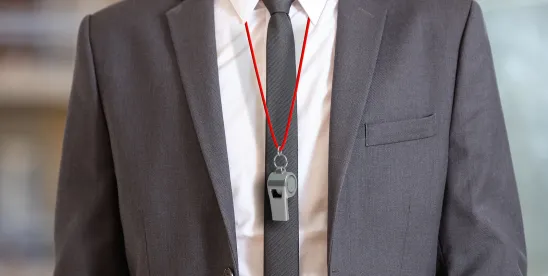On December 17, 2024, the National Highway Traffic Safety Administration (“NHTSA” or “Agency”) adopted a final rule to formalize its whistleblower program under the Motor Vehicle Safety Whistleblower Act (Whistleblower Act).[1] Under the final rule, which adopts the April 14, 2023[2] proposed rule without significant changes, whistleblowers who share original information related to violations of NHTSA’s regulations could receive an award between 10% and 30% of any civil penalties over $1 million paid by the violating entity.
To qualify for this bounty, the whistleblower must provide original information – information that is derived from independent knowledge or analysis that is not already known to the U.S. Department of Transportation (U.S. DOT) or NHTSA. The information cannot be exclusively derived from an allegation made in a judicial or administrative proceeding or other outside source (such as a government report or investigation, or a media report). Whistleblowers must also first report the information through internal channels, except in limited circumstances, such as for good cause shown.
Therefore, manufacturers should act now to ensure they have internal policies in place that, among other things, provide reporting processes that include clear protections against retaliation for whistleblower actions. Fostering a culture of vehicle safety throughout the manufacturing process further reduces the risk of civil penalties and bounties for whistleblowers.
“Original Information”
Under the final rule, a whistleblower who submits “original information” to NHTSA related to violations of NHTSA’s regulations may receive a monetary award in the form of a percentage of any civil penalties over $1 million paid by the violating entity. NHTSA’s final rule clarified that any restitution required of the violating entity is not considered a “civil penalty” for purposes of determining the amount of civil penalties assessed against the violating entity.
Under the Whistleblower Act, Congress defined “original information” as information:
- derived from the independent knowledge or analysis of an individual;
- that is not known to NHTSA from any other source (unless the whistleblower is the original source); and
- that is not exclusively derived from an allegation made in a judicial or an administrative action, in a governmental report, a hearing, an audit, or an investigation, or from the news media, unless the whistleblower is a source of the information.
However, whistleblowers are not required by the final rule to “have direct, first-hand knowledge of potential violations.” Rather, whistleblowers “may have ‘independent knowledge’ of information even if that knowledge derives from facts or other information that has been conveyed by third parties.”
NHTSA excludes from consideration certain categories of information submitted by whistleblowers, including information:
- Derived solely from attorney-client privileged communications;
- Derived solely from attorney work product; or
- Obtained in violation of Federal or State criminal law, as determined by a court.
Therefore, manufacturers should properly mark all attorney-client privileged communications and any attorney work product to prevent them from forming the basis for whistleblower reporting.
Whistleblower Reporting Requirements
To be eligible for the bounty, a potential whistleblower must file a claim for a whistleblower award by completing the WB-AWARD form and submitting it to NHTSA no later than 90 calendar days from the date NHTSA publishes a “Notice of Covered Action,” which notifies the public of its intent to assess civil penalties against a violating entity.
The potential whistleblower must also first report original information through the violating entity’s internal procedures, when such procedures are in place, unless[3]:
- The whistleblower reasonably believed that such an internal report would have resulted in retaliation, notwithstanding 49 U.S.C. 30171(a);
- The whistleblower reasonably believed that the information: (A) was already internally reported; (B) was already subject to or part of an internal inquiry or investigation; or (C) was otherwise already known to the motor vehicle manufacturer, part supplier, or dealership; or
- The Agency has good cause to waive this requirement.
Thus, manufacturers should take steps now to implement internal reporting procedures and foster a culture of vehicle safety to increase the likelihood that they will first receive reports of suspected violations and have an opportunity to act, reducing the potential for civil penalties assessments and whistleblower fees.
Next Steps for Manufacturers
Manufacturers should remember that the best defense against Safety Act violations and civil penalties is to foster a culture of vehicle safety throughout their organizations. Consistent and clear messages that vehicle safety is a priority, coupled with robust internal processes and procedures that encourage reporting and proper evaluation of potential safety issues, can mitigate a manufacturer’s risk on multiple fronts, including the emergent risk associated with NHTSA’s whistleblower program and the risk of civil penalties assessments.
Manufacturers should also ensure that they have internal policies that provide clear protections against retaliation (including protections for whistleblowers, such as an anonymous reporting option) for anyone that reports a potential violation, as well as an appropriate level of transparency for the reporter (such as confirming an issue is being investigated by the relevant safety team). These policies and messages are important steps for fostering a safety culture and should be part of the manufacturer’s regular training programs. Finally, all documents that are subject to the attorney-client privilege or protected under the work product doctrine should be properly marked and stored.
[1] The Whistleblower Act is part of the Fixing America’s Surface Transportation (FAST) Act, signed into law by President Obama in 2015.
[2] See NHTSA Publishes Proposed Rule to Formalize its Whistleblower Program under the Motor Vehicle Safety Whistleblower Act for a discussion of the proposed rule.
[3] See 49 C.F.R. 513.7(g)






 />i
/>i

